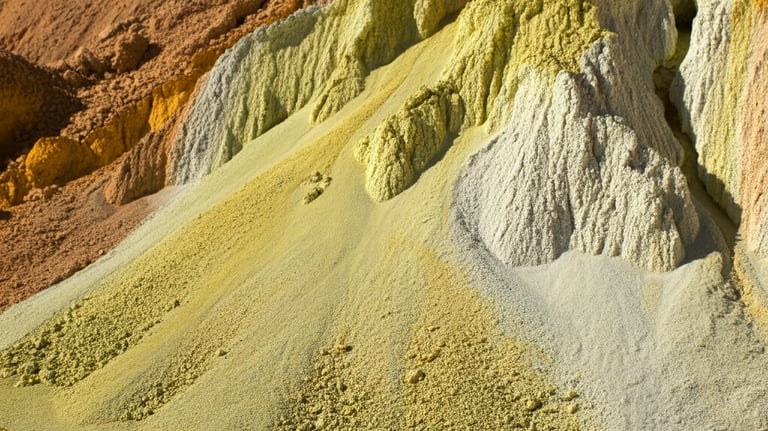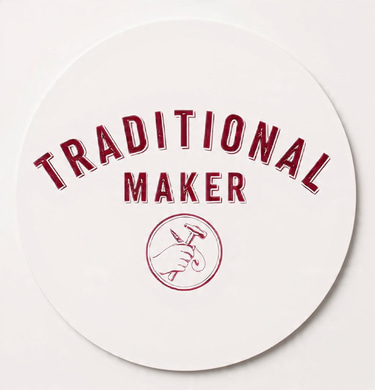An Overview of Morocco's Mineral Resources
RESOURCES & MATERIALS


Morocco is rich in history and culture and is recognized for its lively towns, artisanal crafts, and varied landscapes. Nevertheless, underneath its scenic exterior exists abundant natural resources, especially minerals that have significantly influenced its economy. One of the prominent features of Morocco's natural resources is its plentiful mineral reserves. Phosphate is the most notable, although the nation also has a range of other precious minerals. This article examines the principal minerals for which Morocco is recognized, the mining sector's impact on the economy, and the prospective developments in sustainable mining techniques.
The Sovereign of Minerals: Phosphate
Phosphate is unquestionably the most substantial component of Morocco's mineral resources. Morocco has some of the greatest phosphate deposits globally and is among this essential mineral's leading producers and exporters. Phosphates are crucial for manufacturing fertilizers, which are critical for contemporary agriculture. With the escalation of global food demand, the need for phosphate-based fertilizers intensifies, positioning Morocco's phosphate sector as a pivotal entity in the international arena.
The nation's phosphate deposits are mostly situated in the Western Sahara area, namely at Bou Craa, where a vast open-pit mine generates a substantial share of the global phosphate supply. The OCP Group (Office Chérifien des Phosphates), a state-owned enterprise in Morocco, oversees most of the nation's phosphate activities. The OCP Group is a worldwide leader in phosphate extraction, processing, and delivery. The firm emphasizes the development of sustainable and creative solutions for the agriculture industry.
Besides its economic significance, phosphate mining has had substantial social and environmental effects on Morocco. The sector generates employment and sustains the lifestyles of several people, although it also poses issues with land use, water consumption, and pollution. OCP and the Moroccan government are collaborating to implement more sustainable mining techniques, including water recycling and the advancement of eco-friendly technology.
Beyond Phosphates: Lead, Zinc, and Copper
Although phosphate is Morocco's most distinguished mineral, the nation is also rich in lead, zinc, and copper. These minerals are found in various places, especially inside the Atlas Mountains, which traverse the central section of the nation.
Lead and Zinc: Morocco has a rich history of lead and zinc mining, especially in the Taznakht area next to the Anti-Atlas Mountains. Lead is often used in batteries, radiation shielding, and diverse alloys, whilst zinc is crucial for galvanizing steel to avert corrosion. The extraction of these minerals is crucial to the local economy, generating employment in rural regions and enhancing the nation's total mining production.
Copper mining has been a longtime activity in Morocco, especially in the southern area of Drâa-Tafilalet. The nation's copper mines provide premium copper ore, which is sought after internationally for use in electronics, construction, and energy production. The Akka copper mine is among the biggest in Morocco, producing copper and byproducts such as gold and silver.
Silver and Gold: The Precious Metals of Morocco
While not as renowned as phosphate, Morocco has substantial quantities of precious metals such as silver and gold. The Imiter silver mine, situated in the High Atlas Mountains, is among the biggest silver mines in Africa. The area is renowned for its production of premium silver, used in jewelry, electronics, and photography. The silver mining business in Morocco has fostered the growth of local communities, however also has environmental issues associated with water use and pollution.
Morocco's gold resources, although not as substantial as its silver reserves, are a significant component of the nation's mining sector. The majority of Morocco's gold is located in the southern area, especially inside the Anti-Atlas Mountains. The Tizert project, now under construction, is anticipated to emerge as one of the nation's greatest gold mining enterprises. This initiative highlights the increasing potential of precious metal mining in Morocco and its significance to the national economy.
Cobalt: An Ascendant Element in Morocco's Mineral Industry
In recent years, cobalt has become a crucial mineral due to its use in batteries for electric cars and renewable energy technologies. Morocco is striving to enhance its cobalt output, especially in the Bou Azzer area, which has one of the few main cobalt mines globally. The nation's cobalt sector is set to be pivotal in the worldwide transition to sustainable technologies since cobalt is an essential element in lithium-ion batteries used in electric vehicles, cellphones, and other electronic products.
The increasing demand for cobalt and other battery metals offers both prospects and obstacles for Morocco. It presents an opportunity for economic expansion and employment generation in rural regions. Conversely, it also prompts inquiries on the environmental and social ramifications of mining, especially with land degradation and water use. Gemstones and Collectible Minerals
Morocco is renowned among geologists and collectors for its exquisite jewels and precious minerals. The Atlas Mountains and many nation locations are abundant in vibrant, high-quality mineral specimens coveted by collectors globally. Notable Moroccan minerals encompass:
Vanadinite: This vibrant red-orange mineral crystallizes in striking hexagonal formations in the Mibladen area. Collectors esteem it for its remarkable beauty and scarcity.
Azurite: A rich blue copper mineral, azurite is a preferred choice among collectors. It is often found in proximity to malachite in the Bou Azzer area. Azurite is esteemed for its vibrant hue and complex crystal structures.
Barite is a white or pale-hued mineral in substantial, aesthetically pleasing clusters. Morocco is a prominent producer of high-quality barite specimens, especially from the region around the Atlas Mountains.
These minerals, among others, render Morocco a sought-after locale for mineral aficionados and geologists, who go globally to investigate the nation's varied mineral reserves.
The Prospects of Morocco's Mining Sector: Advancing Sustainability
With the increasing worldwide demand for minerals, Morocco's mining sector is positioned for more expansion. Nonetheless, this expansion necessitates sustainable methods that reconcile economic advancement with environmental conservation. The Moroccan government, in collaboration with entities such as the OCP Group, has been undertaking initiatives to mitigate the environmental issues linked to mining, including water conservation, land reclamation, and the reduction of greenhouse gas emissions.
The OCP Group has implemented steps to enhance water recycling and reduce the carbon impact of its phosphate activities. The firm has engaged in research and development to provide more sustainable agriculture products, including environmentally benign fertilizers.
The Moroccan mining sector prioritizes both environmental sustainability and social responsibility. Mining corporations are striving to enhance labor conditions, provide equitable remuneration, and invest in local communities. These initiatives are essential for guaranteeing that the advantages of mining are distributed fairly and that the sector supports Morocco's long-term developmental objectives.
Final Assessment
The mineral riches of Morocco is fundamental to its economy, with phosphate being a primary and significant resource. Besides phosphate, Morocco has an array of other minerals, such as lead, zinc, copper, silver, gold, and cobalt. These minerals provide significant export value and facilitate employment and development in rural regions.
As the globe transitions to greener technology and more sustainable practices, Morocco's mining sector is evolving to address these problems. Using innovation, investment, and a dedication to sustainability, Morocco is establishing itself as a significant participant in the global mineral industry while endeavoring to mitigate the environmental and social repercussions of its mining operations.
